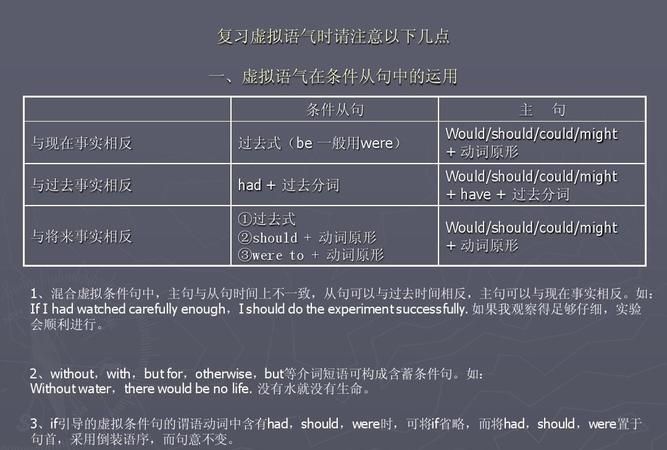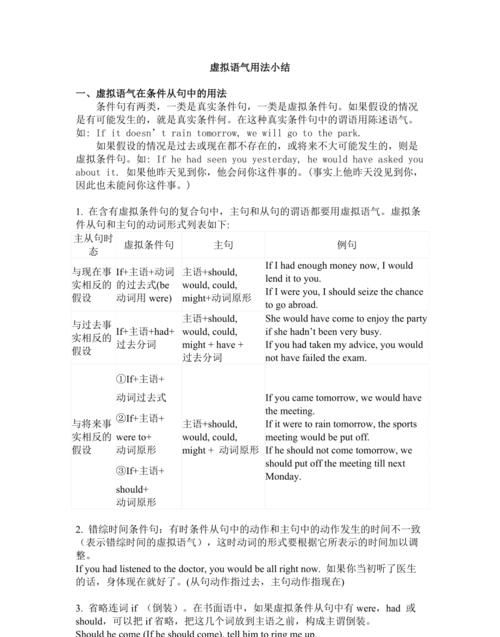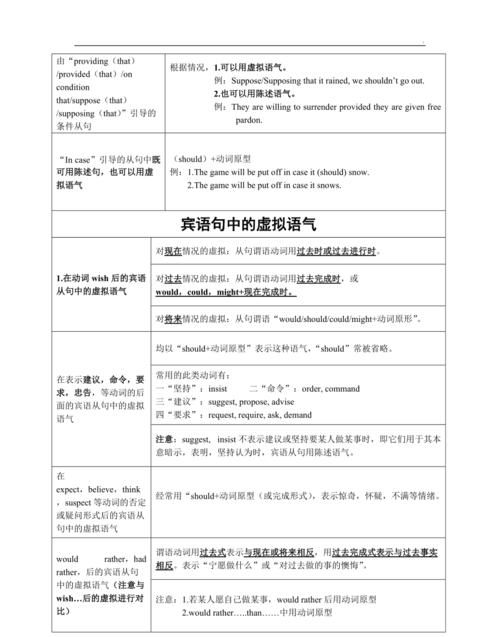本文目录
请大家给我讲下虚拟语气常用的几种形式英语
虚拟语气是一种动词形式,表示说话人的一种愿望,假设,怀疑,猜测, 建议等含义,虚拟语气所表示的含义不是客观存在的事实.它的用法在表情达意的过程中发挥着重要的作用.近几年高考在单项选择这一题型中出现不多,但在完形填空和短文改错中仍然大量出现.例如,2003年高考完形填空第38题考察的就是在篇章语境中的虚拟语气在宾语从句中的用法.虚拟语气的实际用法主要包括以下几种:
1、 虚拟语气用在简单句中,表示“强烈的祝愿或命令的语气”. 常用“May+主语+动词原形”或“主语+动词原形”.例如:May the friendship between us last long. 祝愿我们的友情天长地久. You go out! 你出去!
2、 虚拟语气在宾语从句中的用法.由wish引导的宾语从句常表示说话人的一种强烈的却暂时无法实现的愿望.
How I wish she would be on my side!(But in fact it’s quite impossible.我多么希望她能站在我一边啊!
How I wish I could help him! 我多么希望我能帮助他啊! How I wish I had watched the close NBA game last night.
另外,在表示“命令”、“坚持”、“要求”或“建议”等意义的及物动词(order, command, demand, require, insist, suggest, propose, advise)之后的宾语从句中的谓语动词同样常使用虚拟语气,表示说话人的要求,其结构为:主语+should+动词原形,其中的should常可省略.例如:The head teacher demanded that we (should ) finish the task in time today.
但是,当insist表示“坚持认为”的意思时,或suggest表示“暗示”或“表明”之意时,宾语从句仍用陈述语气.试比较:My parents insisted that I ( should) enter a key university. /My parents insisted that they were right.
The soldier’s pale face suggested that he was happy to have given his life to his motherland.
The monitor suggested that we (should ) hold a class meeting tomorrow afternoon to discuss the problem.
3、 虚拟语气用在主语从句中.
在句型 "It is important (necessary, strange, natural, a pity, suggested, advised, demanded, commanded, ordered ) that . " 中,that 后面的从句中的谓语动词常用:“ should + 动词原形 ”.例如:
It's necessary that we should have a walk now. 我们有必要出去散散步.
It's natural that she should do so. 她这样做是很自然的.
It's suggested that we should take good care of the patient.
同理,在表示“命令”、“坚持”、“要求”或“建议”等意义的名词前后的主语从句、表语从句和同位语从句中的谓语动词同样用虚拟语气,既:“主语+(should)+ 动词原形”的句型.例如:
His suggestion /advice is that we should start early tomorrow morning.
3、虚拟语气用在状语从句中.
虚拟语气最多地用在表示条件的状语从句和表示结果的主句中.在表示与事实相反的虚拟语气时,动词有三种虚拟形式,即虚拟条件现在式,过去式和将来式.
1) 虚拟条件现在式:表示与现在事实相反的假设及根本不可能的假设或结果:
条件状语从句
结果主句
If 主语+ 动词过去式(be 用were)
主语+ would/could/should/might + 动词原形
2)虚拟条件过去式:表示与过去事实相反的假设或结果:
条件状语从句
结果主句
If+主语+ had + 过去分词
主语+should/ would/could/might+ have+ 过去分词.
3)虚拟条件将来式:表示与将来事实相反的假设或结果:
条件状语从句
结果主句
If+ should /were to +动词原形
主语+ should/ would/could/might+动词原形
If I were you, I should get it. 如果我是你,我就买了它.
If I had time now, I would study French. 如果我现在有时间,我会学习法语的.
If you had got up earlier, you could have caught the train. 如果你早一点起床,就会赶上火车的.
If it were to be fine tomorrow, I would go shopping with my friends.
如果明天天气好,我将和朋友们一起去买东西.

日语的语法结构是什么
虚拟语气分为条件虚拟和愿望虚拟两大类,简单介绍如下——
一、条件虚拟
1、由连词引导的条件从句,常用的有:
* if/unless 如果/若非
* 3. even if / even though 即便
* in case:万一,如:
--You should bring an umbrella with you, in case it were raining; of cause there’s no rain today
2、省略 if 后的倒装虚拟,如:
* Were I you, What should I do?
* Had he been here five minutes earlier, he would have caught the train.
3、相关动词分词或短语充当连词
* 过去分词: provided,如:
--*We would pay the bonus provided the job had been completed on time yesterday. 如果工作在昨天按时完成的话我们会发放奖金的。
* 动词原形:suppose (that),如:
--Suppose (that) I were you. 要是我是你多好)。
* 现在分词:supposing,如:
--Supposing it were not Saturday tomorrow. 假如明天不是星期六(就好了)
4、介词 without 短语表示的条件,如:
--Without electronic computers, much of today's advanced technology would not have been achieved. 要是没有电脑的话,就不会取得当前这么多的先进技术
5、but tha t除非,若不是,如:
--They would have got in touch with us two days earlier but that there had been something wrong with the line. 若不是线路有问题的话,他们两天前就与我们取得联系了。
二、愿望虚拟
1、名词从句
1)提出建议、发出命令、提出请求、表示见解愿望,下面以suggest及其派生词为例:
宾语从句:I suggested that he (should常常省略) leave immediately.
表语从句:My suggestion is that he leave immediately.
主语从句:That he (should) leave immediately is my suggestion
同位语从句:My suggestion, that he leave immediately, has not been adopted.
2)用在it is … that 句式表示上述意思,如:
--It is important that he that he (should常常省略) leave immediately.
2、几种特殊的虚拟句式
* wish 从句,如:
-- I wish he knew what is happening there in his room. 要是他知道自己的屋子里正发生着什么就好了。(对此时此刻的虚拟)
--He wished he hadn't done it. 他想要是他没这样做该多好。(对过去的虚拟)
* would rather 从句
--I would rather you (should) come tomorrow.(对将来的虚拟)我宁可你明天过来(暗含你却来不了。)
* it is time 从句
--It is high time you had got up to have your meal. 你早就该起床吃饭了。(但是到现在你还没起来)
* had better 从句
--His mother had better he would have come the next day. 他母亲宁愿他第二天过来。
三、套式虚拟句
在表达某些信条的陈述或信仰的自白的时候,常用套式虚拟句。在这种虚拟句中,谓语动词不受人称和时态的约束,只以动词原形出现在句子中。以下是常见的套语:
1. 表示祝福
* God belss you 上帝保佑
* God bless my life / my soul! 我的天啊! 好家伙!
* God speed you! 祝你一路平安!
* Long live liberty! 自由万岁
2. 表示诅咒
* God damn you! 天杀的! 该死的!
* God forbid! / Heaven forfend!苍天不容! 但愿不会如此!
3. 表示发誓
* Far be it from me to … 我决不会…
* Suffice it to say that … 只要说…就够了。
* Come what may / will … 不管发生什么事情
4. 表示愿望
* God grant ...! 但愿...!
* So be it then. 那样也好
* Be that as it may … 尽管这样
5. 表示感叹
God help him! 唉, 真可怜!
Heaven help us! 苍天保佑!
关于虚拟语气的时态问题
一、条件虚拟句或特殊句式的虚拟
1、对现在的虚拟
* 主句 —— would/should/could/ought to + 动词原形
* 从句 —— 动词过去形式(动词 be 一律用 were)
2、对过去的虚拟:
* 主句 —— would/should/could/ought to + have done
* 从句 —— 过去完成式 had done
3、对将来虚拟,分三种情况:
1)实现的可能性不大 ——(should可省略,但是要注意只能用should 而不可以用其他情态动词)do;
2)实现的可能性很小 —— 过去时(did/were)
3)根本不可能实现 —— were to do
二、名词从句中的虚拟一律用“should + 原形”或者省略 should 直接用动词原形

虚拟语气三种基本结构表格
虚拟语气三种基本结构是:
1.对现在的虚拟结构。
if+主语+动词动词过去时,主语+should/would+动词原形should不可以省略。
2.对过去的虚拟结构。
if+主语+had+过去分词,主语+should/would+have+动词过去时。
3.对将来的虚拟结构。
if+主语+should+动词原形(wereto+动词原形),主语+would/should+动词原形。

虚拟语气应用条件:
在表示假想的虚假的、与事实相反的或难以实现的情况时用虚拟语气,表示主观愿望或某种强烈情感时,也用虚拟语气。即当一个人说话时欲强调其所说的话是基于自己的主观想法,愿望,假想,猜测,怀疑或建议,而不是根据客观实际,就用虚拟语气。主要是英语语法的一种表达。
虚拟语气结构
虚拟语气表示主观愿望和假想虚拟的情况,大体上有两类形式:
1、should. would. may. might 等加动词原形构成
如Would you mind shutting the door? 劳驾关门。
2、和某些时态的形式相同,但表示的时间不同
If I had the money, I would buy it .我要是有钱就买它了。(表示现在情况,却用相当于过去时的形式。)

以上就是关于虚拟语气常见结构,请大家给我讲下虚拟语气常用的几种形式英语的全部内容,以及虚拟语气常见结构 的相关内容,希望能够帮到您。
